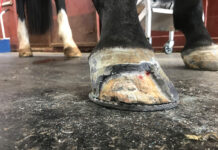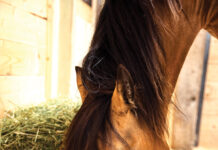 When purchasing hay for your horse, assess its freshness; it should not be dusty or smell moldy or musty. Moldy hay contributes to respiratory ailments in horses. The more mature the hay is when it’s harvested, the more stemmy and high in fiber/low in protein it will be. While this may be nutritionally adequate for lightly ridden horses and easy keepers, it is also less palatable and may not get eaten at all.
When purchasing hay for your horse, assess its freshness; it should not be dusty or smell moldy or musty. Moldy hay contributes to respiratory ailments in horses. The more mature the hay is when it’s harvested, the more stemmy and high in fiber/low in protein it will be. While this may be nutritionally adequate for lightly ridden horses and easy keepers, it is also less palatable and may not get eaten at all.
The two types of hay are grass and legume. Examples of grass hay are orchard grass, Bermuda grass and timothy. Legume hays include alfalfa and clover. Many hay producers grow mixed fields for “combination” hay—for example, orchardgrass and clover.
In addition to considering the type of hay, it’s important to think about the horse’s age, activity level, and specific health needs or conditions. Younger or more active horses may require richer hay for optimal energy, while older horses might benefit from softer, easier-to-chew options. Always consult with a veterinarian or equine nutritionist to tailor the hay selection to your horse’s individual requirements.
In summary, choosing the right hay for your horse involves careful consideration of freshness, nutritional content, and palatability. Balancing different types of hay can help meet your horse’s dietary needs while preventing health issues and ensuring they enjoy their feed.
◆ Back to Horse Health Glossary
◆ Back to Equine Nutrition A to Z
This article originally appeared in the 2010 issue of Horses USA.





